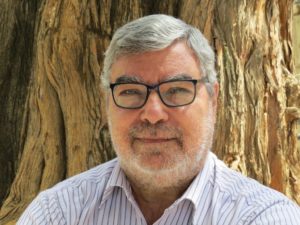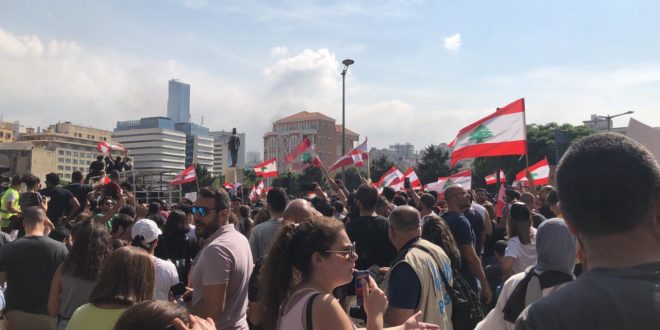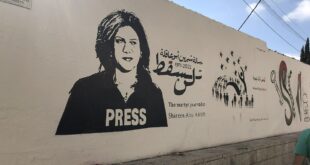On October 17, 2019, protests began in Lebanon with angry and largely disenfranchised citizens calling for a complete overhaul of the country’s unique political system. In the year that has followed, Lebanon has suffered through one disaster after another, with seemingly unending political shifting. On October 22, 2020, former Prime Minister Saad Hariri was reinstated, nearly one year after stepping down from the same position in response to massive public unrest. On August 25, two weeks after the massive explosion that rocked downtown Beirut, Arab Media & Society Managing Editor Sarah El-Shaarawi spoke with Rami Khouri about the state of affairs in Lebanon, how the events have been covered by local and international media, and what role social media has played. Khouri is the Director of Global Engagement and an adjunct professor of journalism at the American University of Beirut. He is also a Nonresident Senior Fellow at the Harvard Kennedy School and a syndicated columnist. Khouri spoke to Arab Media & Society from Boston, Massachusetts.
ARAB MEDIA & SOCIETY: Since you just returned from Beirut, can you talk a little about how things are there?
Rami Khouri: It’s really a terrible situation in Lebanon. There’s been five or six calamities consecutively over the last few years and it’s really more than any society should be asked to endure. All of them can be traced back to the poor quality of governance—and I use that term politely. It’s a combination of corruption, uncaring selfish oligarchy, sectarian warlords, leaders, people who have been in power for twenty, thirty, forty years, and have completely lost touch with the population other than their very narrow base of support and their own religious or political group and all the problems; economic problems, the collapse of the economy, the collapse of the lira, the banking crisis, the import export crisis, the jobs crisis, the electricity crisis, the water crisis, and then the explosion at the port, all of these things are traceable back to really lousy governance. That’s why people rose up starting in October 2019. In October there was a big national uprising most accurately called the Revolutionary Uprising because it was really a popular uprising with revolutionary aims. It is not led like a traditional revolution, it’s just hundreds of thousands of angry, desperate, totally exasperated citizens. The massive explosion came at a time when the coronavirus situation started to worsen. People just don’t know what to do and they don’t care about the virus. They need to go out and make five or ten dollars a day just to feed their families and then of course peoples’ homes have been destroyed. They really don’t care if they live or die, and they tell this to reporters especially young women and men who are interviewed in Tripoli, in Beirut, in the south. This is where we’re at in Lebanon, it’s the culmination of several decades of mismanagement, corruption, incompetence, and the powerful elite’s distain for their own citizens.
AMS: You mentioned it being a revolution that differs from traditional revolutions because it does not have a specific political or ideological shape. What are the implications for creating real systemic change if there isn’t that organized structure? We have seen this play out in other parts of the region, where there haven’t been structures in place to shift the political system. Is there really hope for change?
RK: The people who are protesting certainly hope and expect that they will be able to bring down the elite and replace the system with something better, whether that happens in one fell swoop or is a gradual process, whether it is a negotiated process or a violent political explosion, nobody knows what is going to happen. The political elite certainly think they can stay there forever, so we don’t know the answer. But if we look around the region, we see other examples. I think the most interesting example is Sudan, where you have a negotiated outcome between the protesters and the military, who formed a collective leadership through the professional associations and professional unions, and that created a mechanism whereby they could negotiate a three-year transition, which is now underway, toward a democratic system. Whether that actually happens or not we’ll find out at the end of the three years. That’s one option that I think the people in Lebanon are looking at. There’s a lot of discussion among the activists about what they can do to harness the immense power of the popular uprising combined with the mass discontent and anger against the political elite who have destroyed their lives, destroyed their hopes, destroyed their opportunities, destroyed their futures. I think a critical element of this is going to be the control of money and resources. The government is bankrupt. More and more people are refusing the pay taxes. If you can get a lot of the money that’s going to flow into the country from foreign aid, whether it’s humanitarian aid or to help rebuild and restructure the economy, if that money can flow through mechanisms other than the central government, that will be the final blow that will bring down the government. There’s a lot of tension, a lot of competition right now in Beirut among activists who are trying to convince their international donors not to give money to the government, who they say will steal it. I think the outcome will depend a lot on those factors. But really, the biggest factor, I think, is going to be the decision of Hezbollah, because Hezbollah is, by far, the single most important of the ruling elite and the opposition groups.
AMS: Narrowing down to media coverage; one thing that really stood out after the explosion, and more broadly with events unfolding in Lebanon, was that there has been a really stark divergence in terms of how responsibility has been placed between Arabic language media and English/Western media.
RK: I think, really, it’s a single phenomenon, in terms of how the international media, broadly speaking, and local media cover these events. I think you have to break the media into three different sectors: the Lebanese mainstream media, international media, and social media—who are the most dynamic actors right now in Lebanon. They are the people on the ground running websites in Arabic and English mostly, and a little bit of French here and there. Their social media platforms—independent media—are the most dynamic in terms of explaining the underlying realities of why Lebanon reached this terrible situation and what’s actually going on right now. The mainstream media in Lebanon has always been a commercialized, homogenized, politicized partisan media based on entertainment value and almost nothing else. The quality Lebanese media that we used to have thirty, forty, fifty years ago, Al Hayat, Al Nahar, The Daily Star, and others; this media pretty much lost their professional credibility and have mostly fallen into hard financial times. Many of them only do online publications, which means they get lost in a swarm of websites, so the national media are less of a factor now in terms of really good coverage, except for some TV stations, especially Jadeed or New TV; they have been the most dynamic in terms of being on the ground live all the time, covering events, even if the government doesn’t like it. In terms of the phenomenon of Al Jazeera, they have been providing very good coverage on the ground. So, there is some quality coverage on mainstream media. Mostly, it’s television. Social media is where you can find the most interesting, in-depth, much more nuanced coverage of the underlying issues of the state. They cover things like why trade unions collapsed, the situation of female migrant workers, environmental issues, and all these underlying forces that explain why the citizens are so angry.
The international media have pretty much done what they’ve always done. When there’s blood and bombs, they come in and give you live coverage, really dramatic. I was in the US when the explosion actually happened. I was in Cambridge, Massachusetts, and the coverage was stunningly amateurish. Because all they said was there was this massive bomb, and many people suffered, which is true. They showed you the suffering, which is what media do, but there was almost no attempt to understand why this happened, who’s to blame, what are the repercussions, and what people are trying to do about it. There are some exceptions. Some articles in the American media, the New York Times, the LA Times, Washington Post, the Wall Street Journal, the big papers with money and people on the ground give you in-depth coverage. But they would do one article, maybe a second, and then that’s it. The European media has been better, because they’ve always been closer to the Middle East. They know the region better. They tend to focus on in-depth articles rather than just breaking news. But on the whole, the complexity of the combination of suffering from the explosion with the cumulative suffering from the four or five crises that led up to the explosion; those issues are not probed very deeply, even in Lebanese mainstream media. It really is a problem that’s related not just to Lebanese or foreign media, it’s a problem related to the nature of the media. The media in most of the modern world has been essentially commercialized, politicized, and polarized entertainment more than fact-based knowledge-producing machines, always with some exceptions, of course. You’ll find some brilliant analyses and some really good in-depth reporting here and there, but they’re always the rare exception.
AMS: Moving back to social media, I am wondering what your perspective is on the role social media is playing in the protest movement and if it is something you can compare to what happened in 2011, for example. I think now it’s a fact of life that these tools are going to be a significant part of this activity, but I want to know your perspective on the case in Lebanon specifically.
RK: There have been many lessons learned since the 2010/2011 uprisings, and on social media we can see this. Much of the stuff on social media is ideological nonsense. But there’s also a lot of really good activism and a lot of mobilizing and organizing that is done through social media. There are daily listings in Lebanon for events coming up, protests, strikes, roadblocks, and so on. If a protestor is arrested, which is happening more often in Lebanon, and taken to detention and maybe put on trial for putting something on social media that insults the president or the honor of the country, the social media groups will kick into action immediately, saying who has been detained at what police station. Within half an hour, you will get 50 or 100 protestors who go and stand in front of the police station and chant peacefully, and then lawyers come and demand arrest warrants. So, social media becomes a tool for organizing and mobilizing, and also for documenting the behavior of all groups like government or independent protestors in other foreign countries. There is a lot of documentation going on of how people are behaving in these protests because some of this will be useful later in court as some of the people who are being accused of taking unlawful or excessive action, they have the evidence from all this live coverage. Also, often, you get immediate alerts about fake news, and inaccurate content to ignore. So, if you follow a certain social media that you trust and is known to be trustworthy, that will help you find out quickly whether a lot of the stuff that’s flying around in the digital realm is just propaganda and fake media. This wasn’t the case back in 2010/2011, so I think the social media realm has become much more refined as an instrument of protest.
AMS: You mentioned a lot of it is ideological nonsense and to have your trusted sources, but you’re also talking about individuals who are media literate, who have the ability to discern whether something that they are consuming has a basis in reality; but, there are problems all over the world of misinformation and disinformation. In the case of Lebanon, are you seeing that there are some instances of this sectarian or ideological content stoking division or are people so fed up with the status of the country that they’re able to look past it?
RK: No, there are people who are not very literate in terms of media, but the people who are politically active are much more careful. They won’t just swallow something that’s published. If they see something and it looks dramatic, they’ll ask around. The average person just sees something on Facebook and will react to it, this is common all over the world. The same happens in Europe or the US or other countries. For the political activists, the protestors, they use social media in a much more focused and carefully curated way, so that it has maximum positive impact and minimizes the danger of other people trying to stoke sectarian hatred and fear by putting all kinds of lies on the internet.
AMS: Finally, what do you see as the geopolitical implications regionally of what’s been happening over the last year in Lebanon?
RK: The first thing I would say is that what we can see happening in Lebanon now is the end of a long era of Lebanese exceptionalism. Lebanon, for most of its modern life, was an exceptional Arab country. It was different than the other Arab countries. It wasn’t run by a centralized power, like Egypt or Jordan or Saudi Arabia or Morocco or Libya. It was run by consensus among many different groups. The federal government was not all-powerful; the private sector had a huge role to play, and individual people had the most liberty of anywhere in the Arab world in terms of intellectual freedom and cultural freedom. And, therefore, you had in Lebanon the opportunity for average people to develop their full human and professional and intellectual potential, and that’s why the arts flourished, and research, universities, writing, publishing. These professions flourished in Lebanon well before other Arab countries because people had the freedom to do that. That has ended now. Lebanon, really, has now become just another typical Arab country, and if you look at the main currents of the political system, you have an increasingly pauperized citizenry that is poor and helpless and humiliated and frustrated, and in many cases desperate. This spills out onto the street, and this massive pauper uprising going on in Lebanon right now mirrors others in returning to a centralized political elite that allowed this system of deteriorating public life to happen; deteriorating quality of everybody’s life, and every dimension of life: water, energy, food, jobs, education, transport.
Every dimension of life has deteriorated for every Lebanese person over the last 10-15 years, and this is because of the central government and corruption. This is similar to virtually every Arab country with the exception of a few wealthy oil-rich countries where they have plenty of money and small populations, but I would say ¾ of the Arab countries are in this situation of incompetent, underperforming central governments with a lot of power. And then the third aspect is the militarization of the response of the state to the protesting citizens. So, you have a pauperized citizenry challenging a militarized state. The Lebanese state rarely used military force against its own people. Now it does regularly, and this is new. People are aware of it. They don’t like it. They’re trying to figure out what to do about it. In those respects, I think Lebanon has become typical of other Arab countries. The fourth thing that I would add to that is that you see in Lebanon what you see in other Arab countries: Other countries around the region and the world come in and do whatever they want militarily or politically. In other words, it has essentially lost its sovereignty and cannot control its borders and is open to interference by many other people. These two trends that are regional trends now reached Lebanon, and the Lebanese people are really not happy with this situation, but they just don’t know what to do about it. We’ll find out in the next 6 months or year which way things are going to go.
AMS: Are you optimistic? Do you have any optimism about a brighter future for the country?
RK: I am optimistic because I’ve seen firsthand for years the vitality and the dynamism and persistence and the quality of the average Lebanese citizen, and particularly the professional leaders and people in the protest movements and the NGOs and civil society. These are very sophisticated, determined people, and now they’re also really angry because of what’s happened to them through no fault of their own. So, I’m optimistic that they will be able to have some impact, but it’s going to be slow. It’s not going to happen very quickly.

 Arab Media & Society The Arab Media Hub
Arab Media & Society The Arab Media Hub





